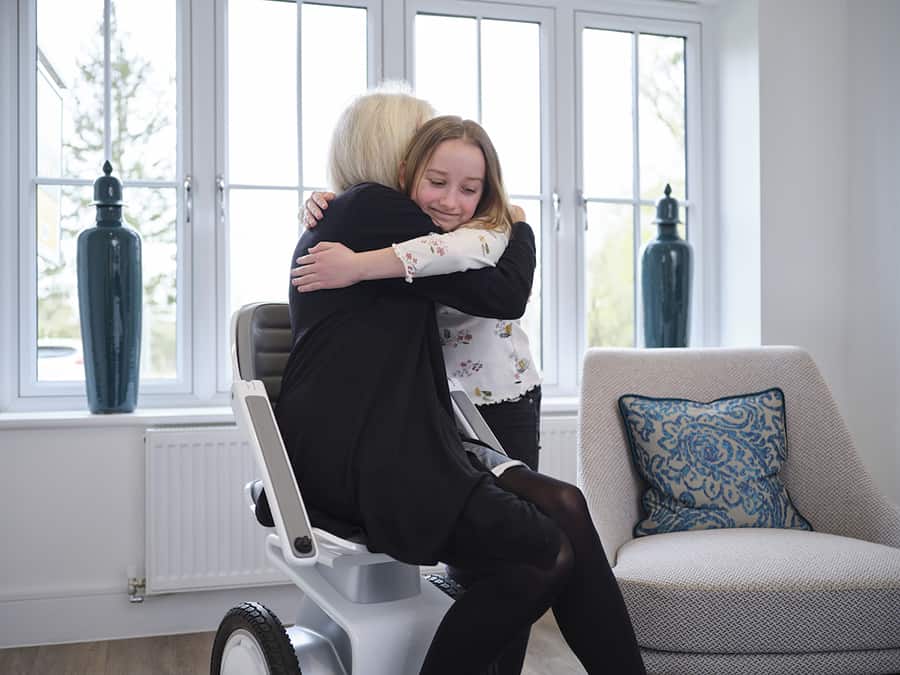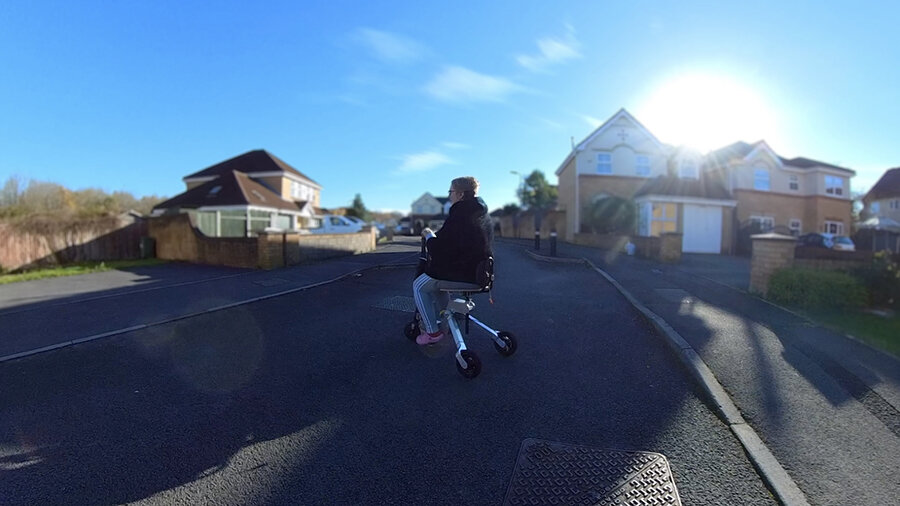Design Age Institute at the Royal College of Art reveals Pathfinder Innovation projects

A self-balancing robotic mobility vehicle, audio-led navigation app, and a mobility-friendly electric vehicle charging cable are among latest Pathfinder Innovation projects supported by the Design Age Institute.
The Design Age Institute at the Royal College of Art has revealed the innovative projects that have come through the 2023 Pathfinder Innovation Programme. The 11 commercially viable products and services have been designed with the goal of enabling individuals and communities to maintain an active and joyful life at every age.
Based at the Royal College of Art’s Battersea campus, Design Age Institute was set up to provide design support for Pathfinder Projects, accelerating an innovative idea for healthy ageing from a prototype towards market. The institute provides and facilitates seed funding for design, user research, opportunity scoping and mentoring, as well as connecting projects with design experts.
Colum Lowe, Director, Design Age Institute, said: “One of the biggest frustrations of my career to date is witnessing how few potential entrepreneurs manage to get their ideas to market, and as such fail to deliver real and lasting benefit to their intended audience.
“It has been a joy to lead Design Age Institute’s Pathfinder Programme which helps overcome some of the barriers that entrepreneurs face, while at the same time demonstrating how great British design can help innovators connect with users, solve problems and communicate benefits making ideas more real, less risky and ultimately more investable.”
From mobility scooters to navigation systems, the 2023 projects focus on key themes including transport and mobility, to support improved health, well-being, and connection for ageing communities. They all demonstrate the significant impact of investment in good design in supporting happier and healthier ageing, according to institute.
The 2023 programme of Pathfinder projects, which are centred around assistive technology, include:
Making the Centaur more intuitive by Centaur Robotics
The Centaur is a self-balancing, two-wheeled personal electric vehicle that keeps older people socially engaged and lets them live at home for longer. Centaur Robotics has been working to optimise the design of the control system of its assistive technology for older users.
The research into creating a more intuitive and easy-to-use design for older users will lead to better and more intuitive controls of the Centaur and has helped to develop the ‘human-machine interface’, taking into account the cognitive and physical considerations of older adults. As well as helping older people, the Centaur can people who cannot walk unaided.
Waymap Newcastle by Waymap
Waymap has developed a wayfinding technology mobile application for those with or without visual impairments that works in both indoor and outdoor settings without the need for physical infrastructure (GPS and WiFi). The app is designed with accessibility in mind; with buttons, search fields, and service flow designed to operate smoothly when voice-over accessibility is enabled on the phone.
Waymap supports the confidence, independence, and mobility of its users by providing turn-by-turn navigation with an accuracy of up to one metre to support users to travel independently using only a smartphone.
BriteWay-XR by Briteyellow Limited
BriteWay-XR is a connected guidance app and web portal that enables safer and more accessible journeys for all. It allows older people or those with reduced mobility to plan their journeys more effectively and travel independently with confidence.
Using virtual reality and augmented reality navigation with indoor position tracking, BriteWay provides the assurance of real-time support from staff or family and friends, while allowing independent travel with confidence. Real-time accessibility information and intelligent routing are used to reassure and route people in a way that avoids overcrowding and provides guidance through complex interchanges. The app will shortly launch to market with Transport for Wales.
ICICLES-EV by Hangar 19
Innovative Cable Improving Charging Limitations Excluding Seniors from EVs (ICICLES-EV), developed by Hangar 19, is a new electric vehicle charging cable/gun targeted at those with mobility impairments, which simplifies the process of moving and connecting the cable.
It is a lightweight version with an innovative design that reduces the amount of force required to successfully plug in a vehicle. It helps those with mobility impairments but aims to set the standard for all charging cables. The charging cable provides an opportunity to help more people convert to EVs without the worry about issues of being able to use public charging infrastructure.
Invisible Creations by PROCare
Invisible Creations, by PROCare, are inclusive, attractive, and dual-purpose mobility products to support people to live well and maintain independence for longer. The outdoor mobility products are combined with everyday garden items, like plant pots and window boxes, to disguise grab rails.
Invisible Creations enables safe and supported access to the outdoors while promoting active mobility and preventing falls, without compromising on dignity and style.
The 3Scooter by Supersmith

Supersmith’s 3Scooter is a mobility scooter that uses adaptive robotics to solve what is says is the “inherent flaw” in all scooters: a lack of stability. It self-levels for improved safety, is lightweight and affordable, and seats riders at 90 percent of standing height, which helps tackle negative social dynamics associated with low sitting positions.
The design transforms how the 3Scooter interacts with both the rider and the terrain, ensuring a safer and more agile ride. Capable of overcoming slopes, cambers and bumps, it brings the empowering benefits of mobility to more people with walking difficulties.
A full list of Pathfinder projects can be found here.
The Pathfinder Innovation Programme has been made possible through the support of UK Research and Innovation (UKRI) Healthy Ageing Challenge, delivered by Innovate UK, the UK’s national innovation agency and Research England.


